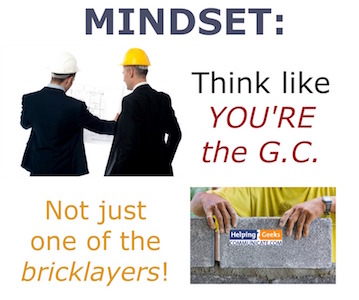Being a great technologist limits you
One of the things I learned when I worked in technology; and now as a coach working with highly technical experts is that sometimes we get stuck “in the weeds” with our heads down focused on personally delivering work.
Why is that? Because we have built our careers on that – our ability to DO the work ourselves has been what made us successful. That has worked – we’ve been able to deliver great technical solutions and our bosses have counted on us to be the smartest person in the room on our technology platform of choice. Our knowledge, skill and capabilities have led to our success.
Here’s The Problem
All of that works – but only to a specific point in our career. I’ve got a client who was a key contributor in technical solutions for many many years. Over time she got promoted to where she was a team lead, a manager, and now a director overseeing a team of highly technical experts. So what did she do? She focused on delivery, carrying out her part of the work and counted on her smart, passionate team members to “do their part.”
This got her in trouble because the people on her team didn’t always prioritize work the way her bosses wanted work prioritized, and since she was so focused on doing her own work, she didn’t recognize the problem until it was too late.
Her problem was her mindset. She was thinking “My ‘real job’ is to do the hands on geek work, and this ‘managing people’ thing is add on. It’s a ‘necessary evil’ that I have to ‘get out of the way’ so I can focus on the ‘important stuff.‘”
It turns out that team members don’t just automatically focus their work on the right stuff. They don’t magically know what’s most relevant to the business folks who pay their salaries. They work on hard problems, on refactoring, on doing elegant work – but that might not be the most important stuff.
And here’s where my client can make a huge difference in her team’s performance. She has seen herself as an individual contributor who adds on the people stuff. Instead she should see herself as the leader responsible for delivering great business solutions.
A man walks up to a construction site where he sees several bricklayers working on a wall. He asks one of the brick masons “What are you working on?” the first worker looks at him like he’s an idiot and says “I’m laying bricks! What does it look like?”
He walks up to the second brick mason and says “What are you working on?” This guy shrugs his shoulders and replies “I’m building a wall.”
He approaches the third man and asks the same question. This mason pauses, turns around, looks carefully at his questioner and with excitement in his voice says “I’m building a majestic cathedral. It’s going to be amazing!”
The third mason’s walls are just as high, strong and straight as the other two, but he has the vision to understand how the work he is doing matters to the overall project.
A Change In Your Thinking
As you move up in your career, you need to begin to think like this mason. In fact, you’ll see a real breakthrough when you realize that your “real job” is not doing the technical work, but it’s to make sure that the right technical work is done at the right time at the right quality level to deliver the value that the business is asking for.
You’re the General Contractor, Not Just One Bricklayer
You need to think like a general contractor, not like a bricklayer. The bricklayer is focused on technical excellence, but doesn’t necessarily understand WHY his work matters to the whole project. He is so intent on his part of the solution that he may not notice if the entire project goes off course, or is in danger of failure.
When you begin to see yourself as the person who is responsible for orchestrating the work of others to deliver, rather than as the one who delivers the work through personal effort, you’ll be able to MULTIPLY your effectiveness.
Adding value through your personal work is additive. Sure you’re smart and can do work better and faster than two other people doing the technical work – but what if you used your super powers to hire “A” players and organized the projects so that they were in their sweet spots. Each of them is delivering double what an average performer is delivering, and you’re overseeing a team of them. The value returned is FAR higher.

But I Don’t Want to Become the Pointy-Haired Boss!
At this point you may be thinking: “Tom, I’ve spent my career developing great tech skills. And I’ve worked with a bunch of bosses who didn’t know the difference between java and javascript. I’m NOT going to give that up and become Dilbert’s Pointy-Haired Boss”
The Pointy Haired Boss is clueless. He plays buzzword bingo and somehow navigates politics and survives in spite of his cluelessness. You can be incredibly productive as a leader of your team without losing your credibility.
But What About My Tech Skills?
You don’t have to give up those skills. Really – you got where you are by being smart, breaking down problems into manageable steps, taking massive action and fixing things that broke along the way.
All of those skills are applicable to being the general contractor. Sometimes you may need to step in an fix a wall, or work on electrical or plumbing issues – and that matters – but what matters even more is your understanding of how those pieces fit together to deliver high value, reasonably priced solutions to really painful business problems your company is facing.
The fact is that as you shift to being the GC, you will have to accept that you’re not the “smartest guy in the room” on your chosen tech. Someone else will step into that role. That is a reality. But that doesn’t mean that your tech skills are irrelevant – they are extremely helpful as you develop great answers with your team.















